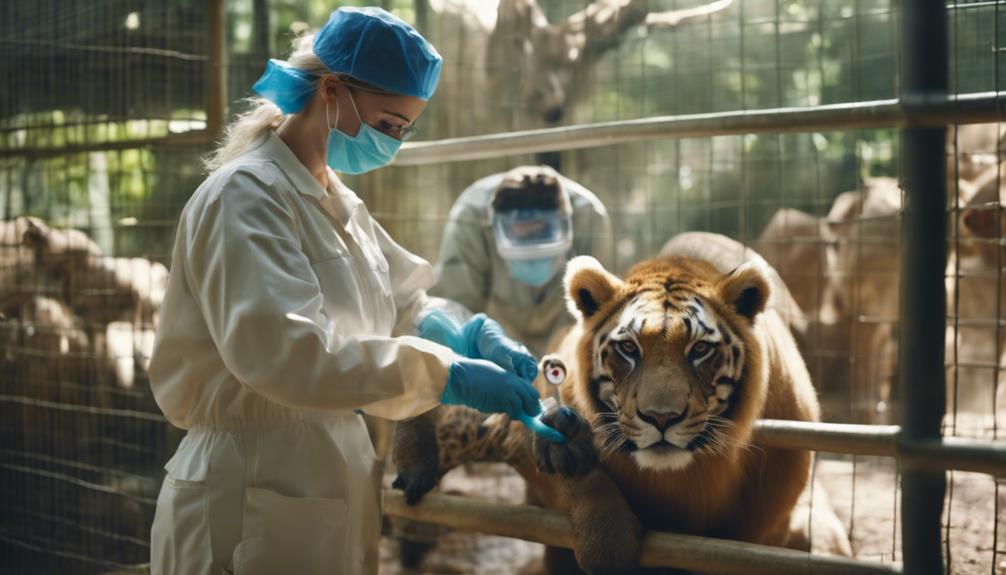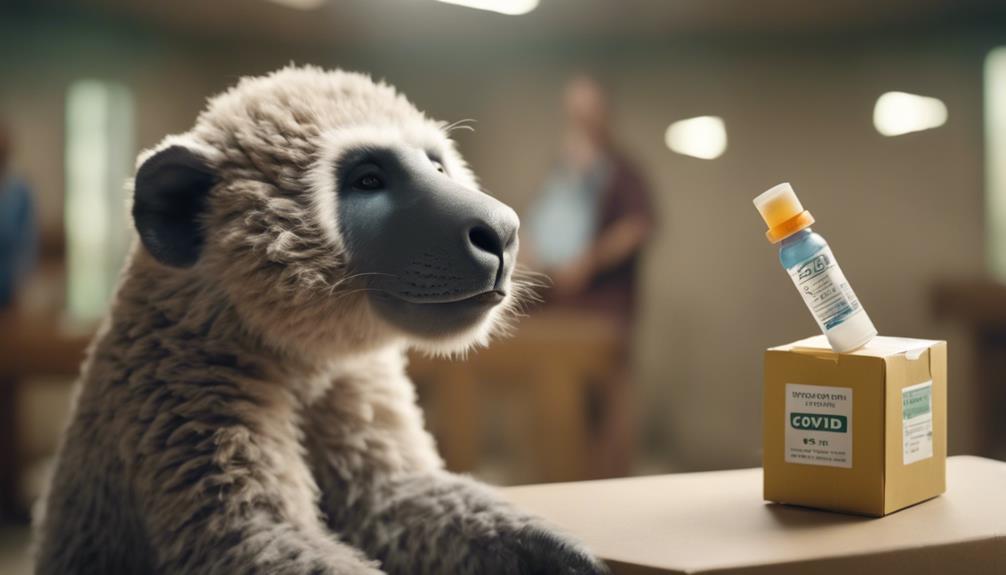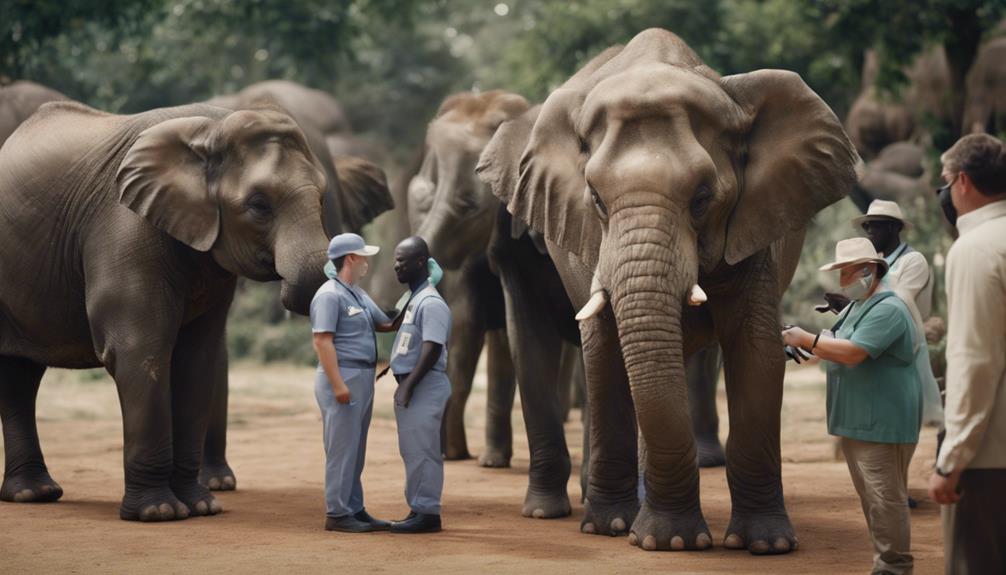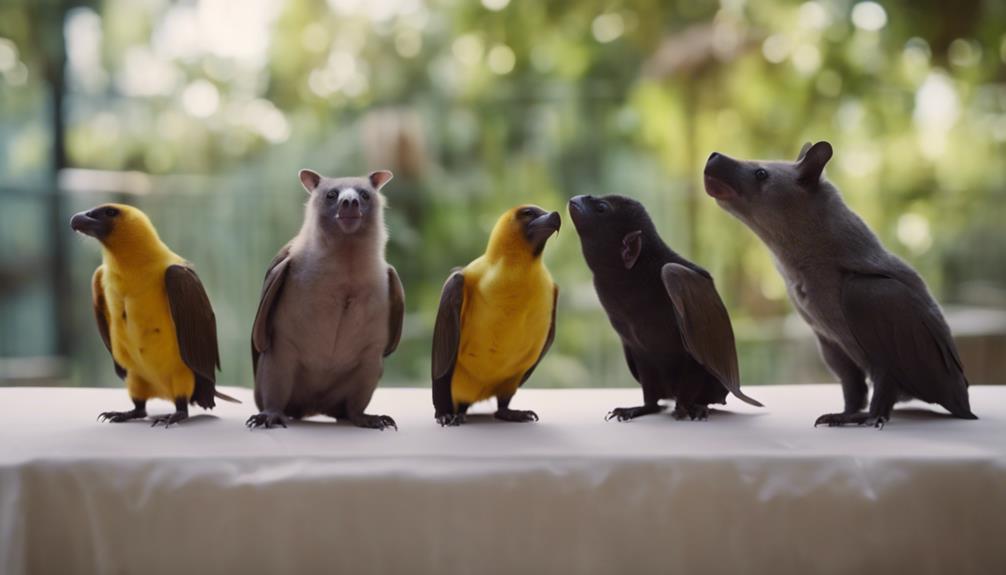As the global fight against COVID-19 continues, a new frontier emerges in the form of administering vaccinations to zoo animals in the United States.
The recent initiatives undertaken by zoos to safeguard their animal populations from the virus signal a proactive stance in animal welfare and public health.
The implications of COVID-19 transmission among diverse species within zoo environments raise pertinent questions about the efficacy and ethical considerations of animal immunization.
These developments underscore a growing awareness of the interconnectedness between human and animal health, prompting a deeper reflection on the evolving landscape of disease prevention strategies in zoological settings.
Key Takeaways
- Zoos in the U.S. are vaccinating animals like big cats and primates against COVID-19.
- Vaccines safeguard animals from the virus, crucial due to human-animal transmission risks.
- Successful responses observed in vaccinated animals like tigers, bears, and ferrets.
- Vaccination efforts aim to protect zoo animals and supplement existing safety measures.
Need for Vaccinating Zoo Animals
Given the susceptibility of animals to contracting the COVID-19 virus, there is a pressing need to prioritize the vaccination of zoo animals to safeguard their health and well-being. With reported cases of apes and big cats testing positive for the virus, it is evident that animals are at risk of infection, often through contact with humans.
Vaccinating zoo animals not only protects their individual health but also mitigates the potential spread of the virus within animal populations. By administering vaccines to species like tigers, bears, and primates, zoos can enhance their existing safety protocols and ensure the overall well-being of the animals under their care.
The vaccination efforts in zoos contribute significantly to the broader goal of preventing COVID-19 transmission and preserving the health of vulnerable animal species.
Reported Cases of Animal Infections
The vulnerability of zoo animals to contracting the COVID-19 virus has been underscored by reported cases of infections among apes and big cats, highlighting the need for heightened vigilance and preventive measures within zoo settings.
- Cases of COVID-19 infections in apes and big cats have been documented in various zoos.
- These cases have raised concerns about the susceptibility of zoo animals to the virus.
- Infected animals have shown symptoms similar to those seen in humans.
- The reported infections emphasize the importance of implementing strict protocols to protect zoo animals from COVID-19.
Transmission Risks to Animals

An understanding of the transmission risks posed to animals by the COVID-19 virus is crucial for implementing effective preventive measures within zoo environments. While cases of animals contracting the virus have been documented, the primary source of infection appears to be human contact.
Animals like apes, big cats, and ferrets have shown susceptibility to COVID-19, emphasizing the need for stringent protocols to limit potential exposure. Although limited evidence suggests animals can transmit the virus to humans, the focus remains on protecting animal welfare.
Vaccine Rollout in Zoos
Understanding the critical role of vaccination in safeguarding vulnerable species within zoo environments, the ongoing rollout of COVID-19 vaccines to animals represents a proactive measure in ensuring the health and well-being of captive wildlife populations.
- Denver and Oakland zoos are actively administering vaccines to big cats and primates.
- Zoetis has generously donated over 11,000 doses of the COVID-19 vaccine to support zoo vaccination efforts.
- Initial doses have been prioritized for ferrets, tigers, bears, and mountain lions.
- The vaccination of animals supplements existing safety measures and aims to protect them from contracting COVID-19.
Donations From Zoetis

Amid efforts to safeguard captive wildlife populations from COVID-19, significant contributions have been made by Zoetis through the donation of over 11,000 doses of the vaccine to support zoo vaccination initiatives.
Zoetis, a global animal health company, has played a crucial role in assisting zoos across the United States in protecting their animal residents from the virus. This donation has enabled zoos to kickstart their vaccination programs, focusing initially on animals such as ferrets, tigers, bears, and mountain lions.
Initial Recipients of Vaccines
Following Zoetis' generous donation of over 11,000 doses of the COVID-19 vaccine to support zoo vaccination initiatives, the initial recipients of the vaccines included ferrets, tigers, bears, and mountain lions, enhancing safety measures for captive wildlife populations.
- Ferrets
- Tigers
- Bears
- Mountain lions
These animals were among the first to receive the vaccine, marking a significant step in safeguarding vulnerable species in zoo settings. The vaccination of these species aligns with efforts to prevent the spread of COVID-19 within zoo populations and mitigate the potential risks associated with the virus. By targeting these key species early on, zoos aim to create a protective barrier against the virus, ensuring the well-being of the animals under their care.
Priority Species for Vaccination

With the aim of maximizing protective measures against COVID-19 within zoo populations, specific species have been identified as priority recipients for vaccination efforts. Big cats and primates are among the priority species for vaccination in U.S. zoos. These animals have shown susceptibility to the virus, with reported cases in various zoos.
By focusing on vaccinating big cats and primates initially, zoos aim to create a buffer against potential outbreaks and protect vulnerable species. Ensuring the health and safety of these animals is crucial not only for their well-being but also for preventing the spread of the virus within zoo environments.
Prioritizing these species aligns with the broader goal of safeguarding zoo animal populations from the impacts of COVID-19.
Positive Responses in Animals
Several zoo animals have exhibited positive responses following the administration of COVID-19 vaccines.
- Increased antibody levels have been detected in vaccinated animals, indicating a robust immune response.
- Animals that received the vaccine show no signs of adverse reactions or side effects, suggesting its safety profile.
- The vaccinated animals are displaying enhanced protection against SARS-CoV-2, reducing the risk of infection and its potential consequences.
- Zoos are closely monitoring the vaccinated animals for any further developments, ensuring their well-being and the efficacy of the vaccination program.
Exclusion of Fruit Bats

Amid the administration of COVID-19 vaccines to a variety of zoo animals, a notable exclusion from the vaccination efforts is observed in fruit bats. This decision stems from the limited human contact these bats have in comparison to other species in zoo settings. While the vaccine aims to protect animals from the virus, the prioritization of species like big cats and primates, which have closer interactions with caretakers, highlights the strategic allocation of resources. Below is a comparison table showcasing the rationale behind excluding fruit bats from the current vaccination drive:
| Factors | Fruit Bats |
|---|---|
| Human Contact | Limited |
| Transmission Risk | Lower |
| Resource Allocation | Focused on high-contact species |
This targeted approach ensures that animals with higher exposure risks receive the necessary protection against COVID-19.
Significance of Animal Vaccination
What essential role do COVID-19 vaccinations for animals play in safeguarding zoo populations and preventing the spread of the virus within these environments?
- Protection: Vaccines shield animals from COVID-19, reducing the risk of infection within zoo populations.
- Transmission Prevention: By vaccinating animals frequently in contact with humans, the spread of the virus from humans to animals can be curbed.
- Vaccine Dosage: Zoetis has provided over 11,000 doses of the COVID-19 vaccine, with a dosage similar to human vaccines but formulated with specific adjuvants for animals.
- Enhanced Safety Measures: These vaccinations complement existing safety protocols, adding an extra layer of defense against the virus for zoo animals.
Related Animal Health Topics

Exploring various facets of animal health beyond the realm of COVID-19 vaccinations, pertinent topics encompassing the well-being and care of animals in zoo environments are of paramount importance. When considering animal health in zoos, various aspects come into play, from preventing diseases to ensuring proper nutrition and enrichment. The table below highlights a selection of crucial animal health topics that are essential for maintaining the overall well-being of animals in zoos.
| Animal Health Topics | Importance | Prevention/Treatment |
|---|---|---|
| Disease Prevention | Vital for animal welfare | Regular veterinary check-ups and vaccination protocols |
| Nutrition | Critical for growth and health | Balanced diets tailored to each species' needs |
| Enrichment | Promotes mental and physical stimulation | Providing toys, puzzles, and activities to prevent boredom |
| Habitat Quality | Affects overall health | Ensuring proper space, temperature, and cleanliness for animals |
Conclusion
In conclusion, the administration of COVID-19 vaccinations to zoo animals is a crucial step in protecting both animal welfare and public health.
By prioritizing the immunization of susceptible species and implementing stringent safety protocols, zoos play a vital role in mitigating the risk of virus transmission within zoo environments.
The positive responses observed in vaccinated animals underscore the importance of these preventive measures in safeguarding diverse populations from the spread of COVID-19.




